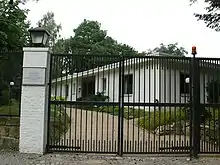Aspen Institute Germany
The Aspen Institute Germany (Aspen Institute Deutschland e.V.) is a German non-profit think tank focussed on Euro-Atlantic cooperation, geopolitical and geoeconomic conflicts, and digitization. It organizes conferences and meetings on such topics with participants from politics, business, academia, media, culture, and civil society.[1] The Institute was founded in 1974[2] as an independent branch of the U.S.-based Aspen Institute in Washington, D.C.[3] The chairman of the board of trustees is Eckart von Klaeden, and Stormy-Annika Mildner has been director since January 2021.[4]

 | |
| Established | October 1974 |
|---|---|
| Founder | Shepard Stone |
| Type | Think tank, NGO |
| Location | |
Director | Stormy-Annika Mildner |
| Website | aspeninstitute.de |
History
The Aspen Institute Germany was founded in October 1974 - as the first in Europe - by Shepard Stone, who remained director until 1988.[2]
From 1989 David Anderson, former U.S. Ambassador to Yugoslavia, took over as director.[5]
In 2001 Jeffery Gedmin was appointed as director, and served until 2006.[6]

In August 2007, Charles King Mallory IV, previously an advisor to the head of the Middle East Division at the U.S. Department of State, took over as director of the Institute.[7] During Mallory's presidency, the Berlin Senate cut the Aspen Institute's grants by about 500,000 euros and ultimately altogether.[8] During this time, the Aspen Institute moved from its longtime villa on Schwanenwerder Island near Wannsee to its current headquarters in Berlin-Mitte.[9]
From September 2013 until the end of 2020, Rüdiger Lentz was director of the institute; he was the first German to hold this position.[2][10]
In January 2021 Stormy-Annika Mildner took over as director of the Institute, after previously serving as head of the department for foreign economic policy at the Federation of German Industries.[4]
Funding
The Institute's funding comes from public institutions including the German Federal Press Office, the German Foreign Office, the Federal Ministry for Economic Affairs and Climate Action, as well as corporate members including Daimler AG, and more than 100 private members.[11]
References
- "Partner der Bundesregierung für Sicherheitspolitik". Die Bundesregierung informiert | Startseite (in German). Retrieved 2023-01-14.
- "Aspen-Institut: Von Berlin aus eine Brücke nach Amerika schlagen" (in German). Retrieved 2022-12-22.
- "Aspen Institute, Berlin" (in German). 2021. Retrieved 2022-12-22.
- "Stormy-Annika Mildner wird Direktorin des Aspen Institute" (in German). Retrieved 2020-06-17.
- "David Anderson, 60, Ex-Envoy to Belgrade". The New York Times. 1997-07-09. p. 11. Retrieved 2023-01-13.
- "Frühwarnsystem für amerikanisch-europäische Irritationen: Jeffrey Gedmin leitet seit dieser Woche das Aspen-Institut" [Early warning system for U.S.-European irritations: Jeffrey Gedmin heads the Aspen Institute as of this week]. Frankfurter Allgemeine Zeitung (in German). 2001. Retrieved 2023-01-14.
- "Kurze Meldungen" [Short Message]. Frankfurter Allgemeine (in German). Berlin. 2007-06-01. Retrieved 2023-01-13.
- Berlin, Berliner Morgenpost- (2004-03-27). "Senat streicht 500 000 Euro Zuschuss für Aspen-Institut". www.morgenpost.de (in German). Retrieved 2023-01-14.
- "Wirtschaft: Goebbels Berliner Insel-Grundstück in neuen Händen" (in German). 2011. Retrieved 2022-12-22.
- "SWR2 Zeitgenossen: Rüdiger Lentz, Leiter des Aspen Institute Berlin | Zeitgenossen | SWR2 | SWR.de". 2018-10-11. Archived from the original on 2018-10-11. Retrieved 2023-01-14.
- "Aspen Institute Deutschland e.V." (in German). Deutscher Bundestag. 2022. Retrieved 2022-12-26.